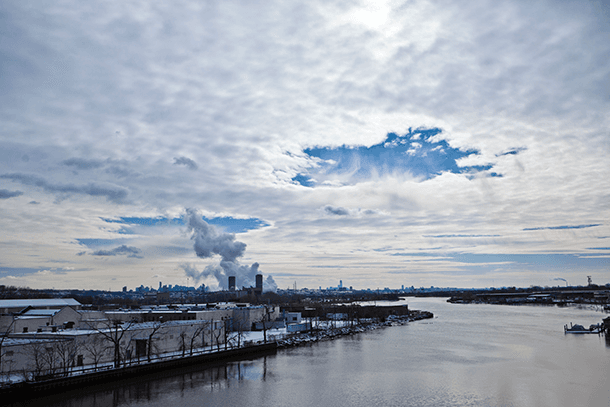Beyond the Headlines
CURWOOD: It’s Living on Earth. I’m Steve Curwood. Off to Conyers, Georgia, now to catch up with Peter Dykstra. Hes with Environmental Health News, thats EHN.org and the DailyClimate.org, and hes been peering beyond the headlines at usual. Hi there, Peter.
DYKSTRA: Hi, Steve. You know, my thoughts are with you in the snowy northeast, have fun with all that snow while you can.
CURWOOD: Oh, well, well try to anyway!
DYKSTRA: But lets start with an item from my ancestral home, also in the northeast, northern New Jersey, specifically the banks of the Hackensack River, and the Jersey Meadowlands. Last year, they got some national recognition for being the Super Bowl site, and what could be better than that?
CURWOOD: Well, tell me.
DYKSTRA: How about being a Superfund site? There are several around the Meadowlands, but now EPA is considering a petition to make a 17-mile stretch of the Hackensack River into one big, long Superfund cleanup venue.
CURWOOD: Ah, a big dump. The locals must be so proud.
DYKSTRA: Well I wouldnt say proud, but a couple of local mayors are welcoming the possibility of hosting the Superfund. The Meadowlands have been a dumping ground for New York City and New Jersey for 200 years garbage, toxic waste drums, guys who couldnt pay the loan shark fast enough so its not like theyre unveiling some well-hidden pollution secret but local officials say theyd appreciate a focused effort to clean up.
CURWOOD: I guess you cant fix a problem unless you admit there is a problem.
DYKSTRA: Right. But one really cool thing about the Meadowlands; its withstood a 2 century long environmental beat down but the place is still alive. In decent weather, you can see kayakers out there, almost literally in the shadow of the Empire State Building, and its not a bad bird watching site, either. The resiliency of the Meadowlands, its potential recovery, and of course all that environmental abuse made it a perfect place for me to learn about the environment. The Meadowlands are in my blood, Steve.
CURWOOD: Maybe youd better see a doctor about that one, Peter.
DYKSTRA: Boom! And speaking of untested chemicalsthe Toxic Substances Control Act, better known as TSCA, is now 39 years old, and both environmental safety advocates and the chemical industry say its dangerously out of date.
CURWOOD: It seems to me that the reform of TSCA has been kicking around Congress for several years, right?
DYKSTRA: Right you are, Steve, Congress is on the case, and as you can imagine, the notorious gridlock of Congress is in full play when it comes to EPA regulating a major industry. Some want to strengthen TSCA, others want a weakened version that would override some of the very strong chemical safety laws passed by several states in recent years, but its all a moot point, because EPA acknowledges that it doesnt have the resources to make the existing law work: about three-quarters of the 80,000 chemicals in use in the U.S. havent even been fully tested, let alone regulated. Elizabeth Grossman in the Guardian this past week wrote a great roundup on TSCA. Oh, and by the way, Roundup, the commercial weedkiller, and its key ingredient Glyphosate? – not covered by the Toxic Substances Control Act.
CURWOOD: Maybe we should regulate the bad puns, too. What have you got for us from the history vault?
DYKSTRA: Eighty-five years ago this week, Clyde Tombaugh discovered the planet Pluto.
CURWOOD: But wait, Pluto isnt a planet anymore.
DYKSTRA: Bear with me here. Clyde Tombaugh was a Kansas farm-boy who had a fascination with astronomy. In 1928, at age 22, he built a telescope, grinding the lenses himself and building its mechanics from parts from a dairy machine and a 1910 Buick. He sent his observations to Arizonas prestigious Lowell Observatory, hoping for a little feedback, and instead, they gave him a job and two years later, he found a new planet. An eleven year-old won a worldwide naming contest, its christened Pluto, 3.5 billion miles from the sun. But in 2006, using the vastly improved astronomical equipment an international panel demotes Pluto to dwarf planet status.
CURWOOD: Could that be an example of planet denial?
DYKSTRA: Well, there are honorable men and women still arguing over Plutos status, and the debate is heating back up: NASAs New Horizons spacecraft will wrap up a nine-year trip to Pluto this summer, and itll send back pictures.
CURWOOD: Thank you Peter. Peter Dykstra is with Environmental Health News, that’s EHN.org and TheDailyClimate.org. Talk to you again soon.
DYKSTRA: All right, thanks again. Talk to you soon.
CURWOOD: And there’s more on these stories on our website at LOE.org.
The story you just read is accessible and free to all because thousands of listeners and readers contribute to our nonprofit newsroom. We go deep to bring you the human-centered international reporting that you know you can trust. To do this work and to do it well, we rely on the support of our listeners. If you appreciated our coverage this year, if there was a story that made you pause or a song that moved you, would you consider making a gift to sustain our work through 2024 and beyond?
